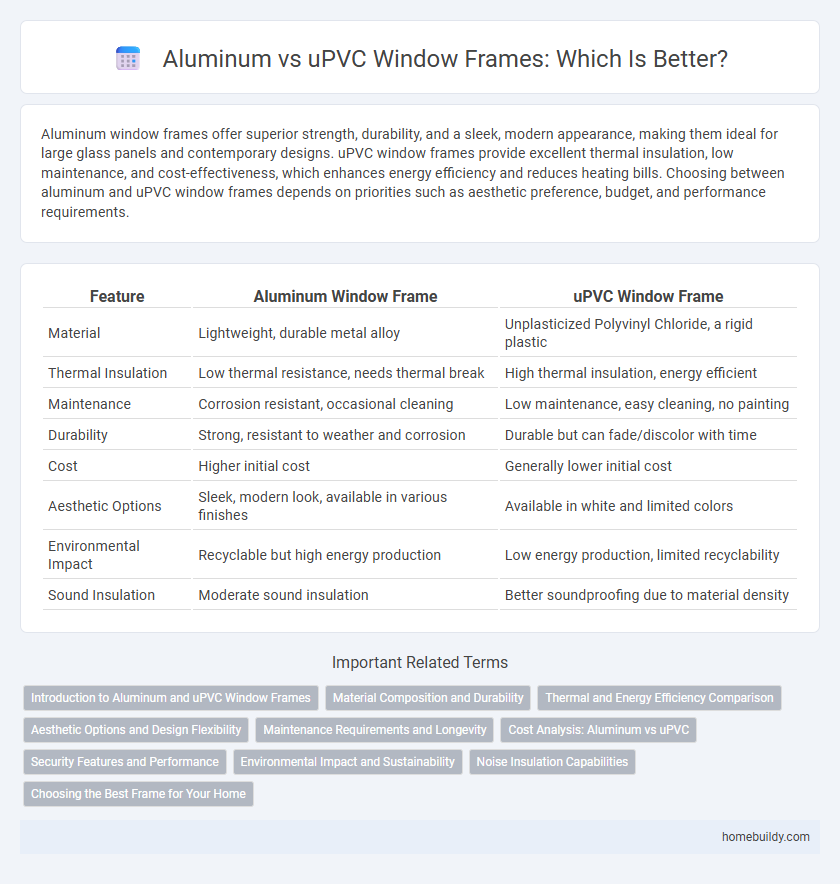Aluminum window frames offer superior strength, durability, and a sleek, modern appearance, making them ideal for large glass panels and contemporary designs. uPVC window frames provide excellent thermal insulation, low maintenance, and cost-effectiveness, which enhances energy efficiency and reduces heating bills. Choosing between aluminum and uPVC window frames depends on priorities such as aesthetic preference, budget, and performance requirements.
Table of Comparison
| Feature | Aluminum Window Frame | uPVC Window Frame |
|---|---|---|
| Material | Lightweight, durable metal alloy | Unplasticized Polyvinyl Chloride, a rigid plastic |
| Thermal Insulation | Low thermal resistance, needs thermal break | High thermal insulation, energy efficient |
| Maintenance | Corrosion resistant, occasional cleaning | Low maintenance, easy cleaning, no painting |
| Durability | Strong, resistant to weather and corrosion | Durable but can fade/discolor with time |
| Cost | Higher initial cost | Generally lower initial cost |
| Aesthetic Options | Sleek, modern look, available in various finishes | Available in white and limited colors |
| Environmental Impact | Recyclable but high energy production | Low energy production, limited recyclability |
| Sound Insulation | Moderate sound insulation | Better soundproofing due to material density |
Introduction to Aluminum and uPVC Window Frames
Aluminum window frames are known for their durability, lightweight structure, and resistance to corrosion, making them ideal for modern architectural designs. uPVC window frames offer excellent thermal insulation, low maintenance, and cost-effectiveness, contributing to energy efficiency in residential buildings. Both materials provide unique benefits, with aluminum frames favored for strength and sleek aesthetics, while uPVC frames excel in weather resistance and affordability.
Material Composition and Durability
Aluminum window frames are made from strong, lightweight metal alloys that offer excellent resistance to corrosion and weathering, making them highly durable for long-term use. In contrast, uPVC window frames consist of rigid polyvinyl chloride reinforced with additives that enhance their strength and resistance to moisture, ensuring they do not rot or warp over time. While aluminum frames excel in structural integrity and longevity, uPVC frames provide superior insulation and low maintenance with a material composition that withstands environmental stress effectively.
Thermal and Energy Efficiency Comparison
Aluminum window frames exhibit high thermal conductivity, often requiring thermal breaks to improve insulation and reduce heat transfer, whereas uPVC window frames inherently offer superior thermal insulation due to their low thermal conductivity properties. uPVC frames contribute significantly to energy efficiency by minimizing heat loss and maintaining indoor temperatures, which can lead to reduced heating and cooling costs. Studies show that uPVC windows can achieve up to 45% better thermal performance compared to aluminum frames without thermal breaks, making uPVC a preferred choice for energy-efficient building designs.
Aesthetic Options and Design Flexibility
Aluminum window frames offer superior design flexibility due to their slim profiles, allowing for larger glass panels and modern minimalist aesthetics. uPVC window frames provide a wide range of color options and finishes, including wood grain effects, catering to traditional and contemporary styles. The choice between aluminum and uPVC affects both the visual appeal and customization potential of window installations.
Maintenance Requirements and Longevity
Aluminum window frames require minimal maintenance, resisting rust, corrosion, and warping, making them ideal for harsh weather conditions. uPVC window frames also need low maintenance but are prone to discoloration and brittleness over time, especially under prolonged UV exposure. In terms of longevity, aluminum frames typically last 30-40 years with durability against environmental wear, whereas uPVC frames have a lifespan of around 20-30 years but may degrade faster under extreme weather conditions.
Cost Analysis: Aluminum vs uPVC
Aluminum window frames typically cost more upfront than uPVC frames due to higher material and manufacturing expenses, with prices ranging from $300 to $1,200 per window compared to $200 to $900 for uPVC. Maintenance costs favor uPVC, which requires less frequent upkeep and resists corrosion and warping, reducing long-term expenses. However, aluminum frames offer greater durability and longevity, potentially offsetting higher initial costs over a span of 20-30 years.
Security Features and Performance
Aluminum window frames offer superior strength and durability, enhancing security by resisting forced entry and supporting multi-point locking systems. uPVC window frames provide excellent insulation and are reinforced with steel or composite materials to improve security and structural integrity. Both materials can accommodate advanced glazing options to optimize safety and energy efficiency in residential and commercial installations.
Environmental Impact and Sustainability
Aluminum window frames have a high recycling rate, with over 75% of aluminum products being recycled, reducing the need for new raw materials and lowering environmental impact. uPVC frames are energy-efficient in production and use but pose recycling challenges due to limited facilities and longer decomposition times. Both materials contribute to sustainability when sourced and disposed of responsibly, but aluminum's recyclability offers a more circular lifecycle advantage compared to uPVC.
Noise Insulation Capabilities
Aluminum window frames offer moderate noise insulation due to their rigid structure and metal composition, but their effectiveness largely depends on additional features like double glazing and thermal breaks. uPVC window frames excel in noise insulation because their multi-chambered design and flexible material create better sound dampening properties, reducing external noise significantly. Studies show uPVC frames can reduce noise levels by up to 50% more compared to standard aluminum frames when paired with high-quality glass.
Choosing the Best Frame for Your Home
Aluminum window frames offer exceptional durability, resistance to corrosion, and sleek modern aesthetics, making them ideal for contemporary homes with large glass panels. uPVC window frames provide excellent thermal insulation, low maintenance, and cost-efficiency, enhancing energy savings and comfort in residential buildings. Choosing the best frame depends on factors like climate, budget, design preferences, and energy efficiency goals.
aluminum window frame vs uPVC window frame Infographic

 homebuildy.com
homebuildy.com